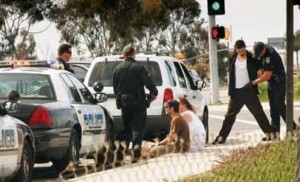




Colorado Criminal Law – Your Rights As A Passenger In A Car Stopped By The Police
By H. Michael Steinberg Colorado Drug Crimes Criminal Defense Lawyer

_________________________
Colorado Criminal Law – Your Rights As A Passenger In A Car Stopped By The Police
Colorado Criminal Law – Your Rights As A Passenger In A Car Stopped By The Police – The scenario is common. You are a passenger in a car that has been stopped by the police. The stop later proves to be illegal. What are your rights to challenge the legality of the stop of the car? This article answers that question.
The reason this issue is so important is if only a driver is detained in a traffic stop, a passenger who is later discovered to be in violation of the law (such as in possession of illegal controlled substances) cannot challenge the original legality of the stop as can the driver under the same circumstances. But if a passenger can challenge the legality of an illegal stop, that passenger can move to suppress any evidence sought to be used against that person at a later trial on charges arising out of the stop.
A Passenger Is Detained No Less Than The Driver Of A Vehicle – The Detention Is The Same
For years many state courts, including Colorado, held that a passenger in a vehicle did not have the same constitutional rights as the driver in the event of an illegal stop. The United States Supreme Court, in as case commonly called the “Brendlin“ decision changed all of that. The Court held that a traffic stop subjects not only the driver, but also his passengers, to a Fourth Amendment seizure.
The Court held that a passenger, if aware of the detention, has the same rights as the driver. Here is the question that must be asked to make this determination:
Would a reasonable person in the passenger’s position, riding as a passenger in a car pulled over by the police, believe himself free to terminate the encounter between the police and himself.
The answer is almost always the same:
…any reasonable passenger, in the situation described, would understood that police officers would exercise such control over the situation that no one in a vehicle would be free to depart without police permission.
If a reasonable passenger in the same situation would have perceived that the show of authority by the police was even partly directed at him, and that he was therefore not free to ignore the police presence and go about his business, he is being “detained” for the purposes of the Fourth Amendment.
A Seizure For The Purposes of The Fourth Amendment’s Prohibition Against Unlawful Search And Seizure
A citizen is “seized” by the police within the contemplation of the Fourth Amendment when the police officer, by means of physical force OR a show of authority, terminates or restrains his freedom of movement through means intentionally applied.
A Loophole – The Passenger Must Be Conscious and Aware
What if the passenger is passed out, or otherwise unconscious such as sleeping in the backseat of a car, and therefore is unaware that he or she has been detained by the police using a show force or their “authority.” The rule in this situation is that there must be some “awareness” that the passenger has been seized before the constitutional protections apply.
….without some awareness of a show of authority directed against him, even actual restrictions on a person’s freedom of movement would not tend to affect the sense of security and privacy protected by the Fourth Amendment.
An unconscious person clearly cannot “perceive” that there has been a show of authority directed against him, and therefore cannot be “seized” within the contemplation of the Fourth Amendment until they regain consciousness.
Summary And Review – Colorado Criminal Law – Your Rights As A Passenger In A Car Stopped By The Police
In almost every instance, everyone in a car during a car stop is under police command and therefore being detained against their will. Therefore all occupants of a car are “seized” for purposes of the Fourth Amendment during a traffic stop, not just the driver.
A person is seized by the police and thus able to challenge the officer’s actions when the officer, by means of force or show of authority terminates or restrains his freedom of movement.
The test is whether, “in view of all of the circumstances surrounding the incident, a reasonable person would have believed that he was not free to leave.” It is very easy to meet this minimal test.
Therefore if a passenger is “detained” for purposes of the Fourth Amendment, the passenger can contest the legality of the traffic stop. Some important findings of the Court:
“Every traffic stop, by its very nature, curtails the freedom of movement of all within the vehicle, and a reasonable person riding in a stopped vehicle would be aware that some wrongdoing led the police to stop the vehicle.”
“If the likely wrongdoing is not the driving, the passenger will reasonably feel subject to suspicion owing to close association; but even when the wrongdoing is only bad driving, the passenger will expect to be subject to some scrutiny, and his attempt to leave the scene would be so obviously likely to prompt an objection from the officer that no reasonable passenger would feel free to leave in the first place.”
Colorado Criminal Law – Your Rights As A Passenger In A Car Stopped By The Police
If you found any of the information I have provided on this web page article helpful please click my Plus+1 or the Share buttons below so that others may also find it.
Never stop fighting – never stop believing in yourself and your right to due process of law.
ABOUT THE AUTHOR: H. Michael Steinberg – Email The Author at [email protected] – A Denver Colorado Criminal Defense Lawyer – or call his office at 303-627-7777 during business hours – or call his cell if you cannot wait and need his immediate assistance – 720-220-2277. Attorney H. Michael Steinberg is passionate about criminal defense. His extensive knowledge and experience of Colorado Criminal Law gives him the edge you need to properly handle your case.
 You should be careful to make a responsible choice in selecting a Colorado Criminal Defense Lawyer – and we encourage you to “vet” our firm. Over the last 40 plus years – by focusing ONLY on Colorado criminal law – H. Michael has had the necessary time to commit to the task of constantly updating himself on nearly every area of criminal law, to include Colorado criminal law and procedure and trial and courtroom practice. H. Michael works hard to get his clients the best possible results in and out of the courtroom. He has written, and continues to write, extensively on Colorado criminal law and he hopes this article helps you in some small way – Colorado Criminal Law – Your Rights As A Passenger In A Car Stopped By The Police.
You should be careful to make a responsible choice in selecting a Colorado Criminal Defense Lawyer – and we encourage you to “vet” our firm. Over the last 40 plus years – by focusing ONLY on Colorado criminal law – H. Michael has had the necessary time to commit to the task of constantly updating himself on nearly every area of criminal law, to include Colorado criminal law and procedure and trial and courtroom practice. H. Michael works hard to get his clients the best possible results in and out of the courtroom. He has written, and continues to write, extensively on Colorado criminal law and he hopes this article helps you in some small way – Colorado Criminal Law – Your Rights As A Passenger In A Car Stopped By The Police.

Other Articles of Interest:
- Colorado Traffic Stops Arrests And Automobile Searches – What Are The Rules?
- Colorado Search And Seizure Issues – Were Your Rights Violated By The Police? Questions Your Lawyer Should Be Asking You…
- Your Legal Rights – Searches At Airports and Other Ports of Entry Into The United States
- Part II – Understanding Colorado Criminal Law -The Authority of Colorado Police and Law Enforcement – QUESTIONING OF A SUSPECT AFTER THE STOP
- Colorado Criminal Law – Traffic Stops – Why You Should Always Refuse To Let The Police Search Your Car












